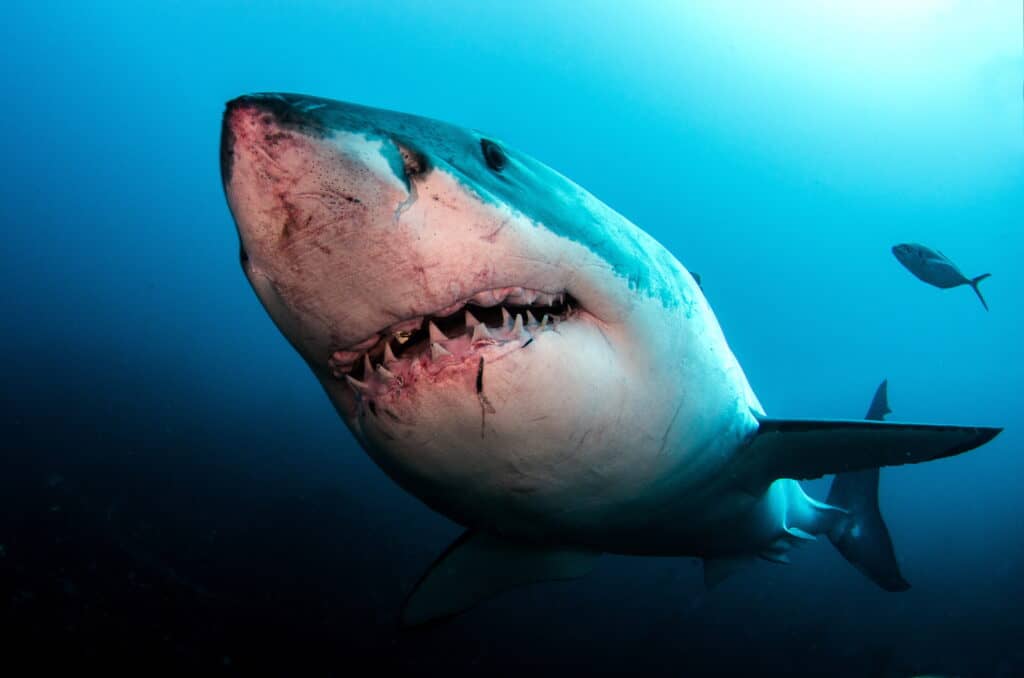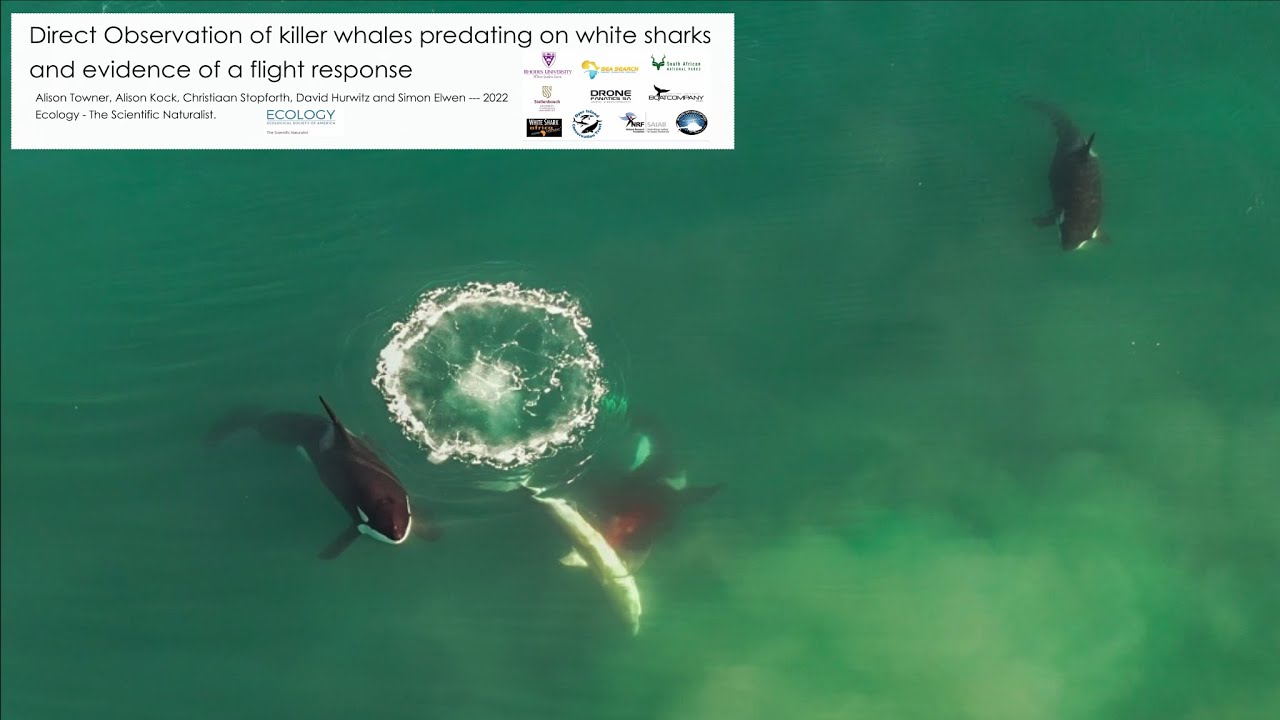The First Aerial Footage Of Killer Whales Hunting And Killing Great White Sharks Is Terrifying
Incredible new footage from South Africa shows killer whales hunting and killing great white sharks. Researchers using a drone and a helicopter have captured the first-ever aerial footage of orcas killing great white sharks.
Author:Hajra ShannonReviewer:Paula M. GrahamJan 05, 20232.1K Shares87.5K Views

Incredible new footage from South Africa shows killer whales hunting and killing great white sharks. Researchers using a drone and a helicopter have captured the first-ever aerial footage of orcas killing great white sharks.
An hour-long killing spree by a pod of orcas was caught from above in Mossel Bay on May 16, 2022. Killer whale attacks on great white sharks have long been suspected by marine researchers, but this is the first time it has been seen on video.
The video was included in a report that appeared in the October issue of Ecology, the journal of the Ecological Society of America. It provides additional context for the conflicts between these two top marine predators.
“„This behaviour has never been witnessed in detail before, and certainly never from the air.- Alison Towner, Marine Dynamics Academy in Gansbaai, South Africa
Only one of the two killer whales in South Africa known to have been involved in killing great whites was shown in the clip, together with four others. Because of this, the authors speculate that the trend might be growing.
Killer Whales And Great White Sharks Interaction
Great white sharks and killer whales are top predators. These two species often fight for seals and whales. Killer whales have attacked great whites in unexpected ways in these situations. A killer whale rammed a great white off Southeast Farallon Island in the 1990s. After pulling it upside down, it swam with the shark for 15 minutes before eating it.
Turning the shark upside down after slamming it may have caused tonic immobility. Sharks relax and cease moving in this stupor, allowing the killer whale to suffocate the shark at the surface.
The killer whale then ate the shark's liver, which contains lipids and oils that keep the great white afloat. In recent South African assaults, killer whales preferentially took the liver and occasionally the heart of their target. Both instances reduced shark numbers.
Great whites converge around Gansbaai and Southeast Farallon Island because of large seal populations. When killer whales were present before or during these shark meetings, great white numbers decreased to a sixth of their usual quantity.
Trackers on Farallon sharks showed that once killer whales arrived and ate seals, great whites left for up to a year. Similar patterns were seen in Gansbaai sharks. Killer whales eat sharks for food, but they also disrupt South Africa's marine environment.

Killer whales eating white sharks in Mossel Bay, South Africa
Killer Whales Hunt Great White Sharks
In two separate instances, orcas cautiously approached sharks, but the shark did not escape, instead remaining in close proximity and keeping the orca in view. This is similar to the tactics used by seals and turtles to avoid being eaten.
Sharks are in the odd situation of being the prey, thus it's possible that they mimic the actions of their predators. Researchers think it would not be as successful for sharks to employ in this case since orcas are gregarious and hunt in groups.
“„Killer whales are highly intelligent and social animals. Their group hunting methods make them incredibly effective predators.- Dr Simon Elwen, Stellenbosch University
Starboard, a notorious killer whale, was found to have been a member of the pod and to have consumed what is thought to have been a huge chunk of shark liver while foraging at the ocean's surface. Another killer whale can be seen biting into the liver area of a white shark in the film.
“„I first saw Starboard in 2015 when he and his close-associated Port were linked to killing seven gill sharks in False Bay. We saw them kill a bronze whaler [copper shark] in 2019 – but this new observation is really something else.- David Hurwitz, Simon's Town Boat Company
Prior to and during these predation occurrences, researchers in the current study analyzed data from drone and cage-diving boat surveys. On the day of the predations, many white sharks were seen, and they had been spotted on every survey day in the weeks leading up to the occurrence.
But in the 45 days after the predations, not a single white shark was seen, proving that sharks fled the area.
Killer Whale Defends Better Than The Great White Shark
Massive and sometimes lethal, killer whales live true to their moniker. They are formidable and perceptive, capable of defeating other sea monsters. Orcas are known to prey on and kill many marine creatures, including great white sharks. While they are formidable opponents in their own right, these sharks cannot hope to defeat an orca.
When it comes to defense, the killer whale trumps the great white shark. With their acute hearing, orcas can locate prey and escape danger. In addition, their huge, stocky frames are covered in blubber three to four inches thick. To provide deadly injury, a predator would have to do a tremendous amount of harm.
Killer whales often interact and spend time with other killer whales. The chances of a predator attacking a pod of killer whales are low. To make matters worse, even if they did, they probably wouldn't be able to outrun them or do enough damage to kill them without perishing themselves in the process.
The biggest great white shark doesn't have any company. This animal relies on its exceptional sense of smell and hearing to locate its prey. The great white shark is a formidable predator because of its speed, size, and ability to blend into its surroundings and evade predators. And their skin is covered with denticles, making them a quieter swimmers than other animals of their size.
Final Words
The lack of great white sharks has allowed populations of fish that would typically be preyed upon by sharks to increase in the South African seas around Gansbaai. Because of this, a previously unknown mesopredator, the bronze whaler shark, has appeared in its place.
Orcas are also preying on these whales, which suggests they are adept at hunting enormous sharks. Local businesses and other organizations that depend on tourists might be negatively impacted if their population starts to dwindle.

Hajra Shannon
Author

Paula M. Graham
Reviewer
Latest Articles
Popular Articles